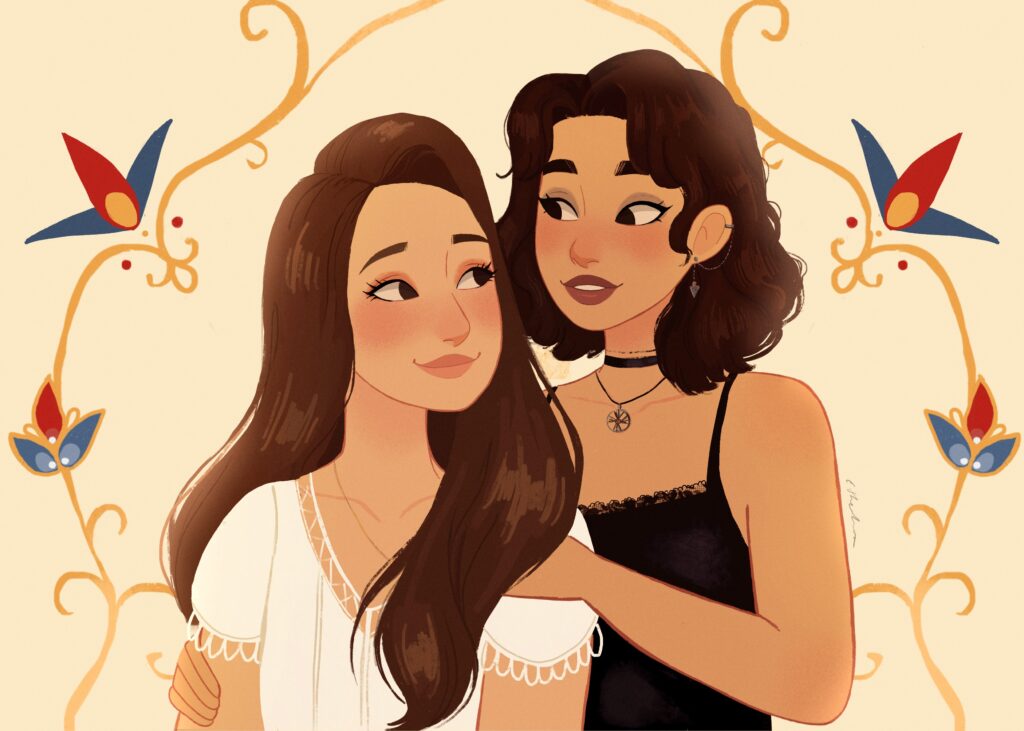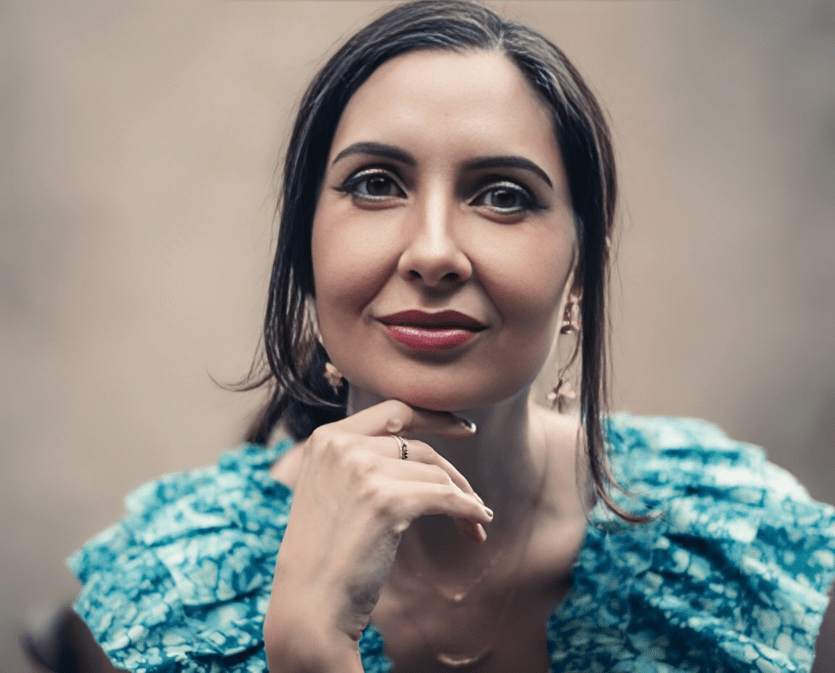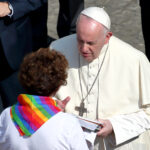Taleen Voskuni: In Conversation
‘I wanted to write both a story about embracing Armenianness and also embracing sexual identity together, especially since those can seem like they’re at odds with one another,’ Taleen Voskuni
Sorry, Bro, the debut release from author Taleen Voskuni, is a fun LGBTQ+ rom-com which follows Nar, an Armenian-American reporter in San Francisco. After her boyfriend proposes in a themed bar filled with tech bros, she realises it’s time to find someone who shares her idea of romance. She decides to attend ‘Explore Armenia’, a month-long festival of events in the hopes that someone from her mother’s spreadsheet of approved bachelors will catch her eye. However, it is Erebuni who enchants her, an intriguing woman who is in touch with her heritage. Erebuni encourages Nar to do the same, the festival starts to feel less of an anxious burden and more like an adventure with Erebuni as her guide. One little problem though, Nar’s not out as bisexual yet.
We sat down with Taleen Voskuni to find out more about her, the book and the inspirations behind her writing.
What made you start writing?
In general, I’ve been writing ever since I can remember. I think I wrote my first story when I was five years old, with more drawings than actual words. I always had this compulsion to write, it seems to be the best way to express myself.
In terms of this book, I remember I was on the train, I heard the voices of these two women speaking to each other and one was saying ‘Urgh, can’t we just have one conversation with Armenians without mentioning the Armenian genocide?’ and the other one sort of gently correcting her. I was so interested in the dynamic there and I felt there was both chemistry and an interesting problem for that woman to solve. I wanted to write both a story about embracing Armenianness and also embracing sexual identity together, especially since those can seem like they’re at odds with one another.
I think a lot of Armenian fiction is so profound and moving but it can be very heavy, understandably, But it may alienate readers or people interested in learning that maybe don’t want to experience it in that way so I want to write an Armenian cultural story in a more accessible form.
What made you write romance in particular?
It’s so interesting cause I used to not be a huge romance reader, I didn’t know about the joy of romance books! I didn’t know that there was this whole world of very fun and also profound books exploring relationships. But any story I did write, was very much focused on relationships. I love love. I always have. I was the person in high school with a million crushes on everybody! Like lists, it was my hobby honestly.
What was your favourite part of writing Sorry, Bro?
I loved fashioning Erebuni out of the dream girl in my mind, that was a lot of fun. But I also loved writing the mom character and the family banter, where they’re making fun of each other but they love each other, they don’t always agree but there’s something very profound that binds them together.

What’s the best piece of writing advice you’ve ever been given?
For me, I was always the reader or writer who didn’t understand why details and place were important, I’d often fly right over details. I took this class with a wonderful teacher Robert James Russell and it was about writing about place and where we’re from and why it matters, how you should only write the story about the place that only you know. You have such a strong sense of place just from growing up and to infuse that place adds this richness and texture to the story. You can use the landscape around you to heighten emotion and make your story very unique.
So in Sorry, Bro a lot of the description of San Francisco, I hadn’t put that in my past stories before. I felt like Sorry, Bro couldn’t be set somewhere else, it had to be set there in San Francisco and I did feel that it elevated my writing. It’s not just the Golden Gate bridge, Alcatraz. And I hope my readers all know now that San Francisco is ice cold during the summer. It’s the coldest place in the world in the summer… Maybe not in the world, north of the equator anyway! It’s very very cold in July and it’s such a pet peeve of mine living here, so I put all my frustration with that in the book.
Was it important for you to have a bisexual main character and LGBTQ+ Armenian representation in the book?
Yes definitely. I wanted to definitely have a bisexual character to bring my lived experience of sexuality to her and to the book and the push/pull of having your foot in both worlds. Especially for Nar being closeted and how that feels.
In terms of Armenianness, I feel it was important to write. I could have written a straight romance and I think there are probably people in the community that think ‘ugh I wish she could have written a straight romance’ but I just didn’t have that story in me. I had to make it queer. I am myself, and talking about writing and why we want to write there was this unexamined part of my life I wanted to delve more deeply into. This is very personal but I feel that I never fully got that chance to explore what a relationship would be like with a woman so I wanna write a damn book about it and another one and another one, but exploring different aspects each time.
The stories with men, I just didn’t have any stories in me that I was burning to write about cause I felt like I’d seen it all! But for women, there absolutely was and then with the Armenian piece, that added another layer because queerness and Armenianness can be so at odds with one another, with Armenians being more conservative, queerness still being taboo in many, or most circles in the Armenian community so there’s difficulty there. And when there’s difficulty there’s a good story so that’s what I wanted to write about, and write about in a happy way too. Like showing that there can be happy endings for queer Armenians. That it’s not all tragedy even though there are many tragedies, there are writers who can better serve those stories and for me, the one I wanted to write was a happy one, cause I don’t think we have many, if any, of those.
What writers inspire you?
So many! Definitely Jesse (Q. Sutanto), my mentor inspires me greatly with her incredible hard work and her ability to plot these complex plotlines and resolve everything so beautifully. She threads so many sub-stories in a very natural way, and always manages to surprise the reader.
I also love and admire Ashley Herring Blake who wrote Delilah Green Doesn’t Care, a sapphic romance. Her writing is so very beautiful, a really strong sense of place which I love and she creates such memorable characters. They feel entirely real.
Speaking of craft and outside my genre, I really admire Leesa Cross-Smith. I knew her when she was a short story writer. Now she has these incredible novels Whiskey and Ribbons, and This Close to Okay. She’s a radiant, ravishing writer and I love reading her and getting lost in the details of her writing.
For Sorry, Bro, early on I was very inspired by a high school friend of mine, Andrew Shvarts and he wrote the Royal Bastards trilogy, a YA fantasy trilogy. I was reading it and realised the voice he had there was very similar to my voice because we grew up in the same area with similar slang, intonation, and the music of our words and I realised ‘Wait I could just write how I speak and think.’ It hadn’t occurred to me before. So I tried that for Sorry, Bro and I think it worked. Enough to get me this book!
What is the book you’d love to be able to read for the first time again?
In the Woods by Tana French. She’s an Irish American mystery writer, but she’s also literary and character-focused. In the Woods just ripped my heart to shreds. I was not expecting that, I thought I was just getting a murder mystery. I do like getting my heart trampled on also. You know I love romance, I love the comfort of a happy ending but also love when it just gets ripped apart. In the Woods did that. I don’t think, knowing that, I can ever experience that again but I would love to experience that again. What does that say about me? I don’t know…

Is there a classic book you’ve tried to read but not finished?
Yeah, there are some! It’s strange because I started Moby Dick and I never finished it. The thing is I actually really enjoyed what I read, I really loved the first part before they get on the boat, it was very profound. It was giving me inspiration and I wrote a little non-fiction essay and quoted Moby Dick in the beginning. But for some reason as soon as they got on that boat, I just couldn’t do it. It was not for me after that so no shade to (Herman) Melville but sorry, I couldn’t go all the way with Moby Dick.
You’ve mentioned online the importance of visibility and how that inspired the book, who are some Armenian creatives you would like more people to know about?
So many. For short stories and films, Robert Nazar Arjoyan. He made this beautiful short film called The Promise and he has pivoted very recently to short story writing and he is churning out really high-quality stories, very fast, often about Armenian characters and subjects, some of them immensely heartbreaking, some of them hilarious. There’s usually a surreal element to all of them.
Aline Ohanesian wrote the book Orhan’s Inheritance, which is a really interesting multi-generational Armenian genocide-related book about, again, something that happened so long ago that still has repercussions in the present.
I feel like Armenian comedians are doing so much for our community. I want to shout out to two, Amy Kazandjian does these hilarious tantig (Armenian auntie) videos that speak to my soul, they’re so funny and so dead on. She actually read Sorry, Bro as my Armenian cultural editor. It was my lived experience but I wanted to see what another Armenian thought of this, to see if there was anything inaccurate or offensive perhaps. There wasn’t! She was very floored by the representation since there isn’t a lot like this.
The other comedian is Mary Basmadjin, she also impersonates an auntie, and she puts on a full wig and glasses. She does a lot of stand up too in LA. They also are always championing Armenian causes, it’s so important for our community.
Final Thoughts:
One of my goals with this book is to share Armenian culture with the world more widely, in this accessible way, because a lot of people don’t know but I feel and many Armenians feel that our homeland is currently under threat.
In some small way, I hope my book will get people to care about Armenians so the next time we’re shouting on social media about how we need help, maybe someone who reads this book will care. Maybe it won’t be from this book but I’m going to keep writing books in hopes that I can do my part in letting the general population know about Armenia and its current and past struggles, in hopes that we get more allies.
Sorry, Bro is released from Pan Macmillian on February 2nd.



